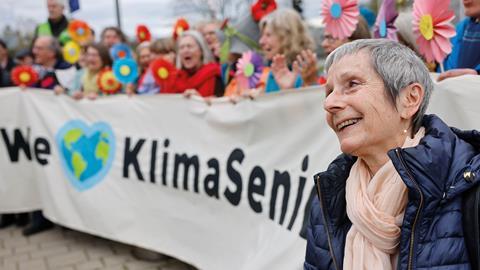Do states have a legal duty to protect us from the harmful effects of climate change? If governments fail to take sufficient mitigation measures, are they breaching the human rights of individuals who may suffer the consequences?

Those are among the momentous questions that the European Court of Human Rights may answer for the first time in three rulings to be delivered tomorrow.
For the claimants, nothing is more important than the dangers of global warming. But according to the states involved – including the UK – these are not matters for the courts.
Understandably for a treaty that took effect more than 70 years ago, the human rights convention says nothing about the environment. But that has not stopped campaigners arguing that provisions such as the right to life (article 2) and respect for a person’s family life (article 8) have been breached by the failure of governments to limit greenhouse gas emissions.
Will the court agree? When I raised the issue in 2021 with Tim Eicke, the UK’s judge in Strasbourg, he explained that the human rights court is able to protect individuals who can show there is a serious, specific and imminent risk to one of the rights protected by the convention. ‘The court has developed principles such as positive obligations,’ he said. ‘These require states to take steps in order to protect individuals, not only against the state itself but also potentially against interference by others.’
The first case listed for judgment was brought by a group of Swiss women, mostly in their seventies or older, who are backed by Greenpeace. To give themselves legal standing, they formed a group called KlimaSeniorinnen – meaning senior women for climate protection.
They argued that their demographic group was particularly vulnerable to climate-induced heatwaves. One told me she couldn’t leave home for about three weeks in the summer.
After losing in the Swiss courts, the KlimaSeniorinnen were told by Strasbourg they would need to establish that they were ‘victims’; that Switzerland was to blame for the effects on their health; that articles 2 and 8 of the convention were engaged; and that Switzerland had failed in two positive duties – to create laws that deter threats to the right to life and that prevent environmental damage affecting the claimants.
The court said it would also need to consider Switzerland’s ‘margin of appreciation’ – in effect, room for manoeuvre – together with international treaties including the Paris agreement on climate change.
Jessica Simor KC, for the claimants, told the court’s grand chamber a year ago that Switzerland must do everything in its power to help prevent a global temperature increase of more than 1.5 degrees above pre-industrial levels. But its actions came nowhere close. She acknowledged that this was the first case of its kind to reach the human rights court but said that national courts had used Strasbourg caselaw to require action by member states.
A few hours later, the court heard a similar claim brought by a resident and former mayor of Grande-Synthe, a suburb of Dunkirk on the channel coast of France. Damien Carême argued that his home and the surrounding areas would be under water by 2040 if France failed to meet its greenhouse gas reduction targets.
The most ambitious case was heard last September. Cláudia Duarte Agostinho is one of six Portuguese nationals now aged between 14 and 25. They suffer from anxiety; four say their health has been damaged by forest fires that have broken out in Portugal each year since 2017 as a direct result of global warming. Their claim was brought against Portugal and no fewer than 32 other European states.
These applicants want the court to build a new model of extraterritorial jurisdiction, the court was told by counsel for the UK and other states. Sudhanshu Swaroop KC said they were ‘asking the court to act as legislators rather than judges and to legislate for a global challenge without having global jurisdiction’. If their claim was successful, any person on the planet who claimed to be affected by climate change could launch a claim against any one of more than 30 states without first having to take action in that country’s own courts.
In response, Alison Macdonald KC argued that the court’s thinking on extraterritorial jurisdiction was evolving. There had to be a ‘sufficient factual or legal connection between the state and the individual capable of giving rise to a state’s obligations under the convention’ – and in this case there was. Action was required from all the respondent states.
This was a bold submission to a court that normally proceeds cautiously. But it seems hard to believe that the judges would have devoted so much time to considering these high-profile claims unless some of them, at least, were expecting to deliver a ruling of real significance.
































2 Readers' comments